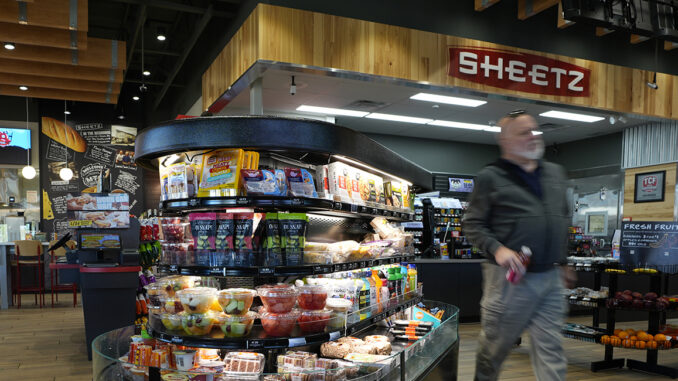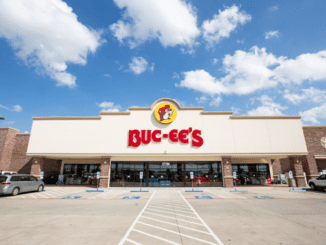
NEW YORK — From 7-Eleven to regional chains like QuikTrip, the operators of c-stores, as they’re known in the trade, are looking overseas for grab-and-go inspiration, adding sit-down seating at some locations, expanding their coffee menus to rival Starbucks and experimenting with made-to-order meals for busy families.
The moves are happening as convenience stores seek ways to offset slowing sales of cigarettes, maps and soft drinks. By tempting customers’ palates with fresh deli sandwiches and build-your-own burgers, the humble food marts want to become an alternative to fast-food restaurants for busy Americans who crave easy, interesting and less expensive eating options.
“It has been a decades-long journey to go from food that was perceived as desperation to destination,” Jeff Lenard, vice president of strategic industry initiatives for the National Association of Convenience Stores, said.
Once known for breakfast and lunch, convenience chains like Wawa, with more than 1,000 East Coast locations, and small operators like York, Pennsylvania-based Rutter’s have moved into dinner time with soup, chicken and fish dishes.
Casey’s General Stores, the nation’s third-largest convenience store operator with 2,500 outlets mostly in the Midwest and the South, introduced warm chicken, pork and hamburger sandwiches on brioche-style buns this year. The company, already known for serving pizza customers enjoy, created a limited-time menu that included pies and sliders made with smoked pulled pork, barbecue sauce and pickles.
In keeping with their quest, convenience stores are expanding delivery services to build on a customer base they found during the COVID-19 pandemic. 7-Eleven plans to take its 7Now delivery app nationwide, allowing users to have pizza, the chain’s signature Slurpees and thousands of other items brought to their doors.
The nation’s largest convenience store chain, owned by Japanese company Seven & i Holdings, offers select Japanese items like chicken teriyaki, rice balls, miso ramen and sweet chili crisp wings at some U.S. locations and its recently acquired Speedway and Stripes stores. Visitors to Japan and Hawaii often respond with envy and astonishment when they taste what’s on offer at a 7-Eleven in Tokyo or Honolulu.
The chain’s North American subsidiary said it works with some of the same food manufacturers and commissaries that serve Seven-Eleven Japan. That includes Warabeya, which is expanding its U.S. operations to help deliver fresh food to stores and provide an assortment of offerings to suit regional tastes.
“Our team draws inspiration from around the world to introduce new items like mangonada donuts with Tajín, barbecue pork sliders, chicken curry bowls and everything breakfast sandwiches,” the subsidiary said in a statement after declining interview requests.
Seven & i Holdings disclosed earlier this month plans to close 444 U.S. locations amid slowing sales, inflationary pressures and an accelerated decline in cigarette purchases. The company is also fielding a buyout offer from Alimentation Couche-Tard, the Canadian owner of the Circle K convenience stores.
Appealing convenience store food isn’t entirely new and has varied widely by region. Buc-ee’s, the Texas-born chain with 50 stores in the South, has a cult following among fans who regularly stop for breakfast tacos and snacks like caramel-coat corn puffs called Beaver Nuggets. North Carolina’s first Buc-ee’s is being constructed in Mebane with an expected opening in 2025.
The coronavirus created a unique role for the sector. Most restaurants closed temporarily at the height of the pandemic, while many convenience stores remained open.
Nonfuel sales at U.S. convenience stores increased 36% between pre-pandemic 2018 and last year, growing from $242 billion to almost $328 billion, according to a National Association of Convenience Stores analysis of sales data from roughly 20,000 locations. During the same period, cigarettes as a percentage of those sales fell from 31% to 20%.
In upping their food offerings, convenience stores now threaten to take business from fast-food chains like McDonald’s, Burger King and Wendy’s, which used summer deals to revive sales, experts said.
Nutritionists and organizations like the American Heart Association encourage service station retailers to focus on fruit and other fresh food that’s healthy.
Kristen Lorenz, a registered dietitian with a private practice in Grand Rapids, Michigan, said convenience food operators have been adding healthier options like lettuce wraps and yogurt parfaits. Previously, the prepared food consisted of meat on a roller and pizza that looked “dry and wrinkly.”
“Everyone has to get gas, and everyone has to eat,” she said. “So, offering a variety of healthy choices that Americans can choose from is good. And what’s great about these stores is they still have the traditional items that can make a road trip fun. You could get a small bag of chips.”



